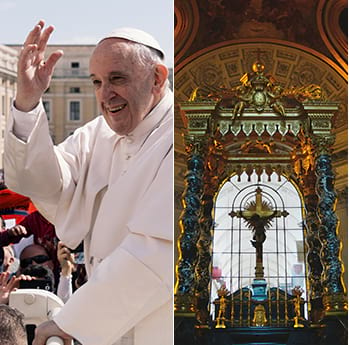The concept “signs of the times” was introduced into official Catholic terminology by Pope John XXIII in the 1961 apostolic constitution Humanae Salutis (HS): “We know that the sight of these evils so depresses the minds of some people that they see nothing but darkness, which they think entirely envelops the world. We, on the other hand, love to reaffirm our unshakable confidence in the divine Savior of the human race, who has by no means abandoned the mortals he has redeemed. On the contrary, following the admonitions of Christ the Lord, who exhorts us to interpret ‘the signs of the times’ (Matt 16:3), amidst such dark gloom we discern not a few signs that seem to offer the hope of a better era for the Church and for humanity” (HS 4).
In our pilgrimage through history where disorder and confusion seem to prevail, God continues to speak of his redeeming care via the signs of the times. We need, therefore, to recognize and interpret them in order to understand how they communicate the loving providence of God.
What are the signs of the times in general?
In the Christian perspective there are three major categories of signs of the times: primordial, perennial and episodic. The Christ event in its totality is the primordial sign of the times, in the sense that all other signs must be interpreted in its light. There are two perennial signs: Creation, revealing God’s providence and the course of history, pointing to God’s continuing involvement. Finally, the episodic signs refer to particular historical events, with both positive and negative outcomes. To identify them and to grasp their meaning requires discernment. While all of creation as well as times of peace and harmony might more easily show God’s providence, troubled times usually require a social and personal internalization, leading to repentance and purification.
In order to recognize the signs of the times, it is necessary to understand the language of the Spirit, who speaks in different “languages” at varied times. It may be in the form of a gentle breeze, a radiant dawn or a lush green canopy where the Divine Artist is at His best. On the other hand, we can also hear the Spirit in the cry of the poor, in the silent groans of the sick and dying, in the frustration of stranded migrants, in the revolt of the oppressed masses, in the violence with which the exploited cosmos responds to ecological degradation, or in the important impulses we feel in our inner selves. Consequently, it is clear that in the process of trying to discern such language of the Spirit, contemplation and discernment must be accompanied by insights that come from the humanities and faith.
Some Fathers of the Church, including Basil the Great, Maximus the Confessor and Augustine, attached great importance to reading creation in order to comprehend divine wisdom and the message it addresses to humanity. They considered Scripture and the created world as two “books” which, so to speak, reveal God to us.
This article is reserved for paid subscribers. Please subscribe to continue reading this article
Subscribe
Welcome to
La Civiltà Cattolica !
This article is reserved for paid subscribers
Please login or subscribe to continue reading this article
























